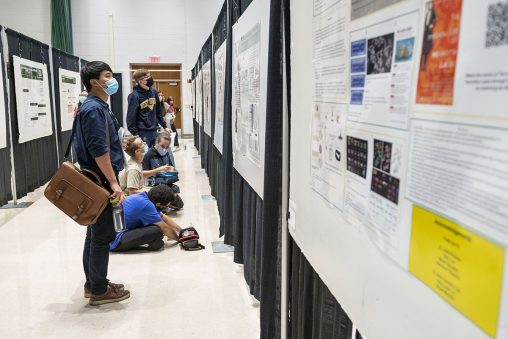Detection of heavy metals using nanoparticles. Wastewater surveillance that enables early detection of coronaviruses. Counterproductive work behaviors. Personality variables related to political affiliation.
This was among the research presented by Wright State University students at the Festival of Research hosted by the College of Science and Mathematics.
The Oct. 8 event drew well over 100 students, faculty and others to the Student Union Apollo Room. The Festival of Research featured more than 15 podium talks by student researchers as well as sessions that enabled attendees to stroll through a honeycomb of poster displays and engage with individual researchers.
“We’re here to celebrate and hear about the good work our undergraduate and graduate students have been doing the past couple of years as we navigated this pandemic,” said Don Cipollini, Ph.D., professor of biological sciences and director of the Environmental Sciences Ph.D. Program. “For the students who are actually doing the research, this provides an opportunity to gain skills in presenting and communicating that work to the world.”
Chynna Spitler, a senior majoring in physics, conducted research on magnetic field compression and the effects of the sun.
“Giving a presentation was a fantastic experience,” she said. “I gained a lot of extra knowledge and got that presentation experience under my belt and I’m ready to do more in the future.”
Mia Williams Burnett, a graduate student working on her Ph.D. in environmental sciences, presented a poster on Henrietta Lacks, an African American woman whose cancer cells are the source of the HeLa cell line, the first and one of the most important cell lines in medical research. Lacks was the unwitting source of the cells and neither she nor her family was ever compensated for their use.
Williams Burnett said she hopes the poster raises awareness about African American pioneers of science and an appreciation by researchers of where the cells they use in their research come from.
Williams Burnett’s other poster was on aryl hydrocarbon receptor modulators, which offer potentially healthier alternatives to drug design and treatments for autoimmune diseases.

The Festival of Research featured podium talks by student researchers and a poster session of research by undergraduate and graduate students. (Video by Kris Sproles)
After she graduates with her Ph.D., Williams Burnett hopes to run a government lab and/or start her own business.
Jennae Shelby, a medical student also pursuing her Ph.D. in biomedical sciences, wants to be a neurologist and do research at a research institution, run her own lab and specialize in cognitive disorders.
“What we’re looking at is cognitive impairment that we see in Type 2 diabetes and looking at what cellular changes are occurring in neurons that is leading to this,” she said.
Shelby said her favorite thing about the Festival of Research is that it features a wide variety of research and enables her to “get outside of her own bubble.” She said it also helps the student researchers focus on the big picture during their presentations and make their research relatable to other people.
“It’s very exciting,” said Ivan Medvedev, Ph.D., associate professor of physics and director of the Interdisciplinary Applied Sciences Ph.D. Program. “Preparing the talks, I think, helps students organize their thought process. That’s how they become better researchers.”

 Wright State to expand nursing facilities to meet workforce needs and prepare more graduates for in-demand careers
Wright State to expand nursing facilities to meet workforce needs and prepare more graduates for in-demand careers  Wright State student-athletes make a lasting impact on local family with more to come
Wright State student-athletes make a lasting impact on local family with more to come  Wright State names Rajneesh Suri dean of Raj Soin College of Business
Wright State names Rajneesh Suri dean of Raj Soin College of Business  ‘Only in New York,’ born at Wright State
‘Only in New York,’ born at Wright State  Wright State president, Horizon League leaders welcome new commissioner
Wright State president, Horizon League leaders welcome new commissioner 